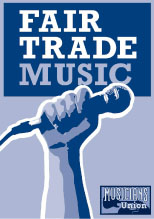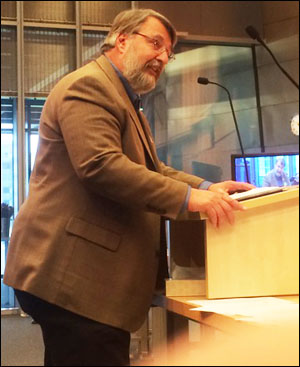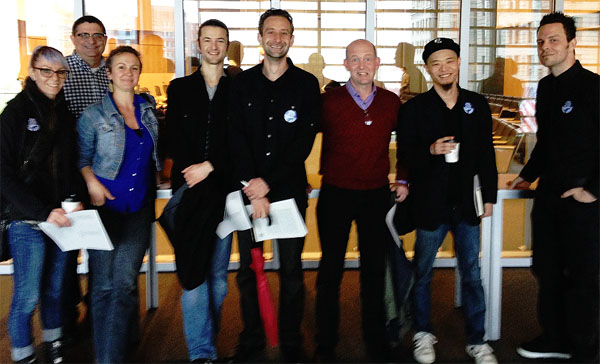LOCAL
Seattle City Council panel OKs Fair Trade Music measure
 The following is from Fair Trade Music Seattle:
The following is from Fair Trade Music Seattle:
SEATTLE (May 14, 2015) — The Seattle City Council’s Finance and Culture Committee on Wednesday unanimously endorsed a resolution affirming its “support for all workers, including musicians, having the right to negotiate fair contracts establishing equitable relationships and enforceable standards,” and declaring May 20, 2105, to be “Fair Trade Music Day” in Seattle.
The resolution, co-sponsored by Councilmembers Mike O’Brien and Nick Licata, noted that “live music should be valued in a way that enables working musicians to make a living wage in order to provide for themselves and their families, with working conditions based on a fair and equitable relationship including enforceable standards, mutual respect and transparent accountability between musicians and the venue in which they work.” (Watch Wednesday’s hearing here.)

Jeff Johnson testifies at Wednesday’s hearing.
Fair Trade Music Seattle is a campaign by local musicians, with the support of American Federation of Musicians Local 76-493, to establish standards for equitable treatment by area clubs. They have obtained written pledges of fair treatment from about 20 area music clubs (see the list below).
Jeff Johnson, President of the 400,000-member Washington State Labor Council, testified at Wednesday’s hearing and noted a 2008 city study finding that music adds $2.6 billion to the area economy, supporting 11,000 direct music jobs.
“We need to recognize that cultural workers are just like other workers,” Johnson said, “but many musicians have no income protection in the clubs.”
After the hearing, Johnson released the following statement:
I had the great honor to be able to testify in support of the Fair Trade Music resolution along with six musicians who gave compelling testimony about how difficult it is to make a living in Seattle clubs without written performance contracts. Often times musicians themselves have to “pay to play.” That’s right. Not receive any money for performing or are shortchanged on verbal agreements. Fair Trade Music calls on clubs to sign a pledge that they will sign a written performance agreement specifying wages, benefits, responsibilities, cancellation policies, terms for merchandizing and a mechanism for resolving disagreements. So far 20 clubs have signed on to the Fair Trade Music pledge.
Jay Kenney is a 35-year veteran jazz, pop and rock keyboard and violin player who helped found Fair Trade Music.
“Often verbal agreements were the best we could get,” he said. “But often — even with written agreements — at the end of the night, we wouldn’t be compensated as we’d been promised.”
This has an impact on Seattle’s reputation as a “music city,” said Nate Omdal, an upright bassist who plays jazz and hip hop. “Our image suffers when world class acts from around the globe leave Seattle reporting problems with quality of the clubs or difficulty with pay.”
A heavy metal guitarist who preferred that his name not be used due to fear of retribution from venue owners told the committee about an incident in which his band was asked by the club to lend their instruments to a touring band. The venue would not guarantee covering the costs of any damage, nor would they give his band a written agreement of any kind. Although his band sold tickets that brought in most of the audience, they received less than 10% of the ticket sales as payment. And for the national band using their instruments, the local musicians got an extra $50 — for the whole band. For the night, the whole band received less than $200. It turned out that the national band had a written contract mandating that the club spend more than $2,000 to rent instruments — instead, the club paid the local band $50.
“My reluctance to name the club or use my own name is a large part of why I became active in Fair Trade Music,” the musician said.

The musicians who testified at Wednesday’s hearing.
“Being a musician is what I love, what I do,” added vocalist, composer and teacher Katrina Kope. “We just want to make sure that musicians in the city are treated fairly.”
Steve Roseta, a promoter with a Microsoft business background, said that he has positive experiences with many venues, and generally is able to insist on a written agreement. But he described an incident in which, even with a written agreement, the club tried to make “deductions” from what his musicians were to be paid.
“It took me more than a month to get the $117 they owed,” he said, “and that was hard for me as a business guy. It would be nearly impossible for a musician worried about getting another gig from that club.”
Many clubs in Seattle do treat musicians well, added jazz composer, pianist and educator Michael Owcharuk. “They recognize that treating musicians professionally is in their interest – but a minority are often unfair to musicians.”
Ed Mays has been a musician and music teacher for more than 40 years. He has helped scores of kids to become musicians.
“I’d like them to be able to stay in Seattle,” he said, “but a lot of them end up going to San Francisco or New York because they can’t make a living here.”
Council President Tim Burgess noted that the problems facing musicians tie in to the Council’s agenda for protecting workers’ rights, such as the wage theft ordinance. Councilmember O’Brien stressed that the Fair Trade Music campaign has implications for a variety of other workers, particularly contingent workers, who similarly fall through the cracks of traditional labor law.
The full City Council will vote on the resolution on Monday, May 18.
“We’re out to change the culture in our music city so musicians are valued as much as the music; so musicians get the same protections as any other workers; so musicians are paid along with the bartender, wait staff and dishwashers’ so musicians can make a living in Seattle,” explained Musicians Local 76-493 organizer Paul Bigman. “We want nothing less than to ensure that all venues provide fair treatment for musicians.”
Following is a list of Fair Trade Music Venues:
- 88 Keys Dueling Piano Bar (Pioneer Square)
- Capitol Cider (Capitol Hill)
- Egan’s Ballard Jam House (Ballard)
- The Moore (downtown Seattle)
- Nectar Lounge (Fremont)
- Neptune (University District)
- The Paramount (downtown)
- Pies and Pints (Roosevelt)
- Re-bar (Denny)
- Royal Room (Columbia City)
- SeaMonster (Wallingford)
- Showbox (downtown)
- Showbox SoDo (SoDo)
- Skylark Café (West Seattle)
- Sound Check (Lynnwood)
- Stone Way Café (Fremont)
- Tula’s Restaurant and Jazz Club (Belltown)
- Vito’s (downtown Seattle)
- Seattle Theatre Group (STG) productions
For more information about Fair Trade Music Seattle, visit (and “like”) their Facebook page.





